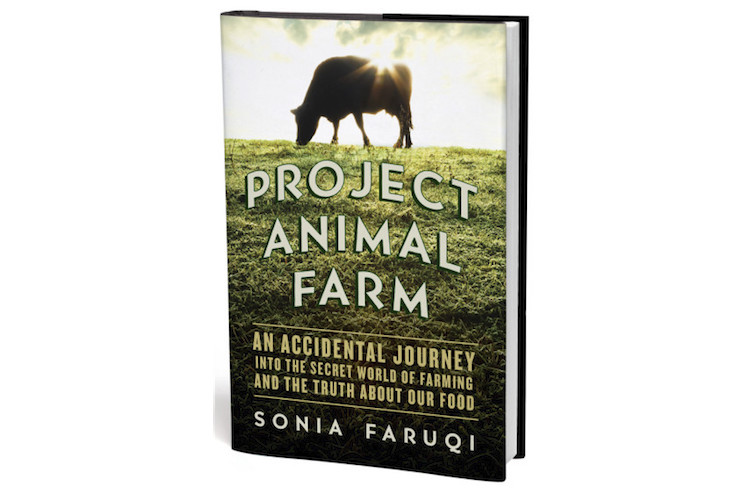

After graduating from Dartmouth College with a graduate degree in economics, government and public policy, Sonia Faruqi entered the world of Wall Street. From there, her free spirit led her to an unexpected stay at an organic dairy farm where she discovered that “organic” was not all that her consumer mind had been trained to believe. Determined to seek answers to the secrets the animal agricultural industry held, she dove into her research by experiencing all that she could firsthand. Faruqi contacted farmers, slaughterhouse workers and industry professionals from all around the globe, and what she discovered has now been recorded in her first book, Project Animal Farm: An Accidental Journey into the Secret World of Farming and the Truth About Our Food, which was released on June 15th. The book explores the mysteries of the food industry and aims to be a catalyst in improving the lives of people and animals around the world.
Faruqi begins her journey clueless and unaware as she is welcomed by the Millers, a couple who have transitioned their once conventional farm into a certified organic one. Though they have been farming organically for 30 years, their farm is hardly the natural, organic vision you might believe. Instead it is a dim representation of organic management, slightly better than the grim conventional farms we know to exist. Cows lay “shackled to stalls by neck chains” and “behind [their] back hooves lay a “manure gutter,” a low channel that lined the rear of [the] stall.” Through the eyes of the Miller’s 65 cows, a compassionate Faruqi sees a $35 billion dollar industry with plenty of disparities, an industry where the questionable methods of animal agriculture remain unexposed. Soon, her heartfelt vacation with the Milllers turns into “a global expedition into the deepest, darkest recesses of the animal agricultural industry.”
From the top-secret egg-warehouses in Canada to the fast food factory farms of Malaysia, Faruqi exposes the depths of animal agriculture with a fresh, young and adventurous perspective. Her journey leads her to farms of varying degrees. Most memorable are the Malaysian farms of the fast-food industry. Faruqi’s research discovers that Malaysia is home to over 1100 fast food restaurants including McDonalds, KFC and Pizza Hut. Malysia, like neighboring countries, used to provide products through backyard farming, but now is completely industrial. Faruqi records on a visit to one of the chicken farms, “Their bellies were plump, pink, and bare of feathers, and their wings were lumpy stumps. Their large feet flailed through the air comically as they shrieked in my hands. They were ghostly caricatures of chickens—harmless, but terrifying to witness in their harmlessness.”
Project Animal Farm is a crisp, journalistic narrative, in which Faruqi records her experience in harsh, but vast detail. As she attempts to sort out her discoveries, personalities like that of Nader, a vegetarian slaughterhouse worker, are revealed. Only one person of many, he is shown to struggle with fears for his future in the industry. Through his fear and psychiatric struggles, Faruqi captures the problems of a shattered, undiscovered industry.
Not for the faint of heart, Project Animal Farm is a recommended read dedicated to the discovery and exploration of the animal agriculture industry. The experience of Faruqi’s journey is exposed to interest the curious and to give awareness to the ignorant. Flung into the depths of her recorded expedition, the reader travels along with Faruqi as she opens our hearts and minds to the reality of conventional and organic farms around the globe.
About the Writer
Feature image of the book ‘Project Animal Farm’ via choosecagefree.org